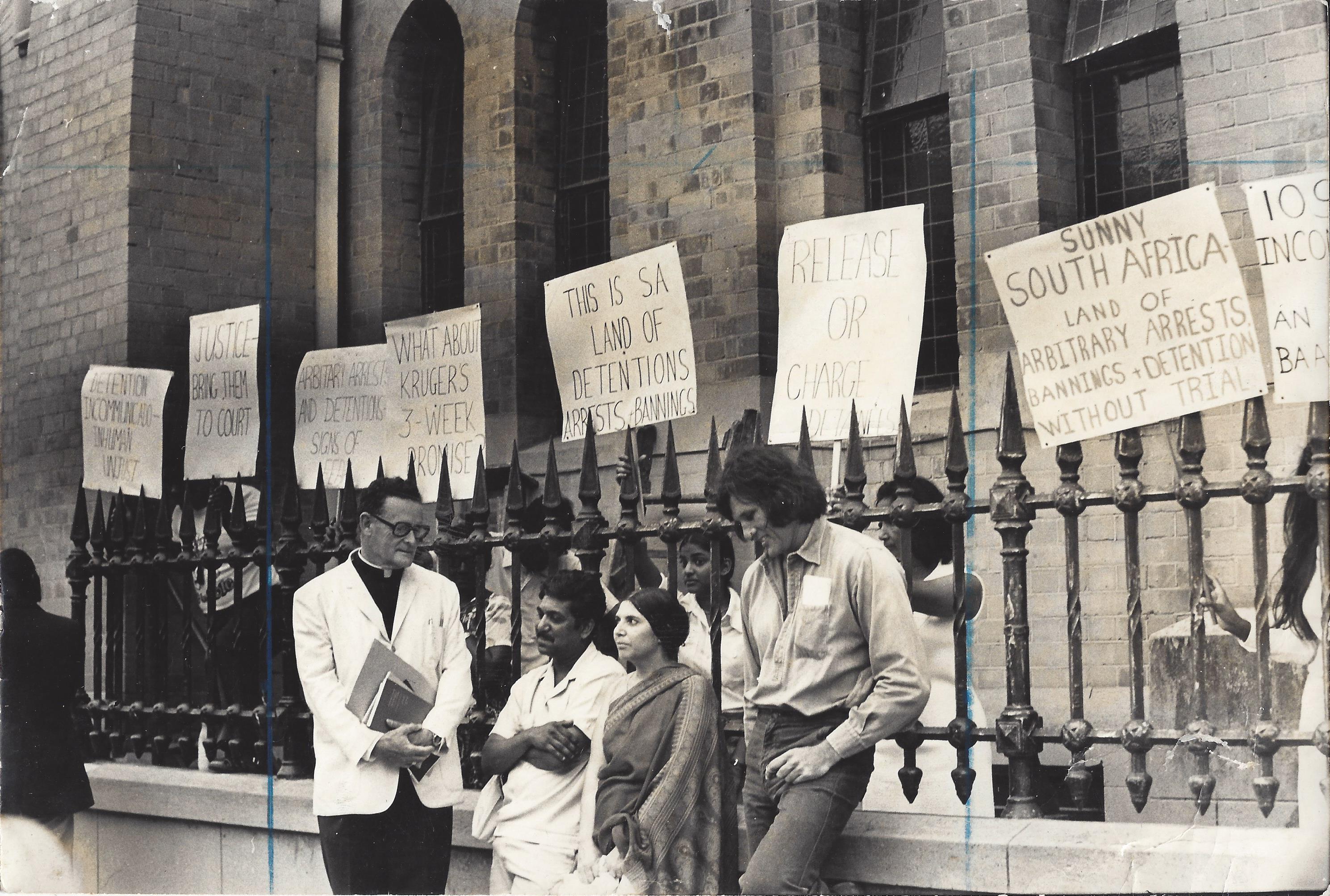Document Preview
Document Preview
Protest against Detentions

Protest against detentions in front of Emmanuel Cathedral, Durban 1975.
From left to right: Bishop Hurley, Unknown, Fatima Meer and Mike Kirkwood
Fort Beaufort is situated in the Eastern Cape Province. The town is surrounded by magnificent mountain ranges and it is known for it's infamous Citrus Farming. Fort Beaufort is a short way away from Hogsback, Grahamstown, Fort Hare University, East London and Port Elizabeth
Fort Beaufort was founded in 1822, when a frontier post was established by Lt. Col Scott. The British army occupied Fort Beaufort until 1870. The Historical Museum, Military Museum and Martello Tower attest to the Town's military past and had a population of 25,668 in 2011.
Additional Date: November 11, 1918
At 11am on the 11th November 1918 a truce came into effect between Germany and the Entente forces. This was supposed to be the war that 'ends all wars'. Yet by 1919 there were still between 20 and 30 wars being waged around the globe.
According to Col Lionel Crook from the SA Legion there were 18500 military casualties from South Africa in this war.
The 1884 Berlin Conference was an attempt to divide up Africa among the respective colonial and imperial powers. By the start of the 20th Century the entire world had been divided up among them. Tensions rose as further expansion meant the direct and open conflict with a rival colonial power.
African soldiers and support staff from South Africa received no medals nor any recognition for their participation in World War 1. There were 83000 Africans and 2000 Coloureds who served in the World war 1 on the side of the Entente forces. The SS Mendi was sunk in 1917 with a loss of 600 SA soldiers and support staff.
The end of World war 1 spurred on the anti-colonial struggles and the fight for independence from colonial rule intensified.
The 11th November is commemorated each year in memory of all who lost their lives in this and subsequent wars.
There were 11023 SA casualties in World War 2. This time, although some African soldiers received medals and were supposed to be retained in the army, African and Coloured soldiers were again badly treated. Most were discharged from the army with only a 2 pounds payment, a khaki uniform and in some cases a bicycle as well, with a small additional sum based on the length of service. During the war when there was heavy fighting in Libya , SA soldiers and stretcher bearers were also killed. They were buried together. The SA Military Command rejected this and had the bodies dug up and so the White and Black soldiers were re-buried separately. Stretcher bearer Lucas Majozi was awarded the 'Distinguished Conduct Medal' while Job Masego was awarded a Military medal for courageous and meritorious conduct.
Wonderboom Airport, is located north of Pretoria, South Africa. The airport handles general aviation flights and passenger services. The Wonderboom Airport was opened in 1937. Built on a Wonderboom farm, it was used temporarily for military training during World War II.
The airport has been extensively extended, with a new terminal building and hangars being constructed as well as the runway being extended in 1965. This extension led to the Airport being able to receive its first Boeing 737 in 1982.
Wonderboom was originally only an airstrip owned by the Pretoria Municipality.
Military History Journal
Vol 10 No 1 - June 1995
(incorporating Museum Review)
SOLDIERS WITHOUT REWARD
Africans in South Africa's Wars
by J S Mohlamme
Introduction and background
To recount the part played by the African peoples of South Africa in the wars that have been fought by South Africans, one has only to turn back the pages of early South African history, for since those early years until the present Africans have played a by no means insignificant role.
From the earliest times, the white people of South Africa have been in the habit of drafting Africans under their sphere of influe
In the second of a series of scholarly articles leading up to Armistice Day on 11 November, Martin Plaut, journalist and senior research fellow at the Institute of Commonwealth Studies, on what white Afrikaner leaders and black South Africans gained for their show of patriotism during the First World War.